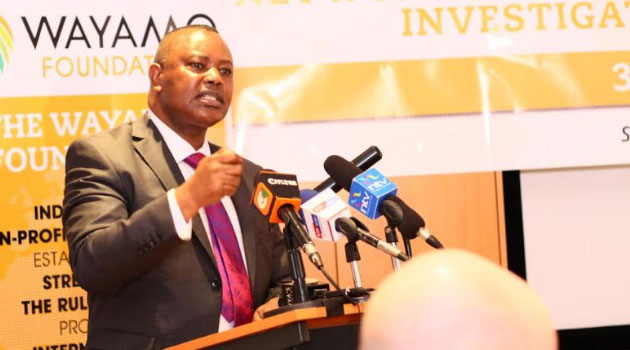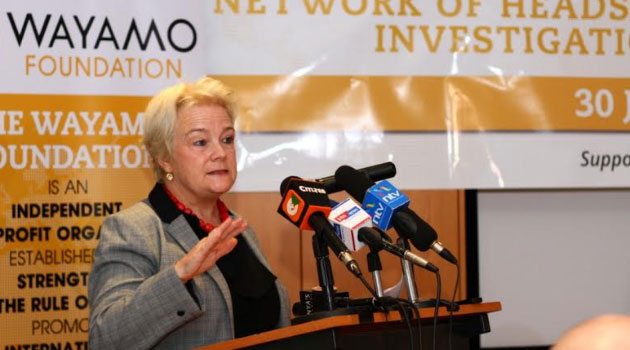
DCI George Kinoti at a meeting of chiefs of criminal justice systems in the region. Photo/JOSEPH MURAYA.
NAIROBI, Kenya, Jul 30- Corruption has been identified as the main nerve for most transnational crimes like human trafficking within the region, making it difficult to combat the vice.
Despite existence of good laws, enforcing authorities have been accused of turning a blind eye on some of these vices, at the expense of the rule of law.
The remarks were made during an Inter-Governmental Authority on Development (IGAD) meeting in Nairobi on Tuesday, which was attended by chiefs of criminal justice systems, who met to discuss common security challenges and ways of addressing them.
Kenya was represented by Director of Public Prosecutions Noordin Haji and Director of Criminal Investigations (DCI) George Kinoti, at the meeting organized by Wayamo Foundation- a non-governmental organisation working on strengthening the rule of law.
Wayamo Foundation Director Bettina Ambach said, “the overall aim of the DPP and DCI network is to strengthen the rule of law by ensuring effective investigation and prosecution of complex crimes and intensifying inter-agency collaboration at the regional level.”
The network is meant to act as an avenue for regional and cross-border collaboration and mutual legal assistance in international and transnational criminal cases, promote collaboration amongst investigators and prosecutors and serve as a think tank to foster discussions about emerging crime patterns.
The DPP said corruption is a common threat across the region and one that has provided a fertile ground for transnational criminals, whose web is complex and challenging to infiltrate.
“Our systems have had a big problem, in terms of integrity. We have beautiful laws, that we are unable to execute because of our integrity challenges,” the DPP said.
He added that “corruption allows these threats to thrive.”
His sentiments were echoed by DCI Kinoti who highlighted the menace of contraband goods as among the leading threats for safety more so in healthcare.
And this, he said could be a reason why there are rising cases of cancer in the country, even though he did not back this with scientific proof.
“We have been consuming poison. Some of the products we have confiscated were expired for more than 7 years,” he said, while detailing some of the legal hurdles he has been facing.
“I have refused to release some of the goods. I am on the firing line because of that,” he added.
On human trafficking, he said those involved have deployed new tactics over time and have networks across borders.
A case study is the recent rescue of an infant, who was being trafficked to Tanzania from Kenya.
Two Kenyans and a Tanzanian were arrested at the Isebania border on July 22 while transporting the month-old baby to the neighbouring country for a birth notification, in an elaborate scheme which authorities believe tie together immigration and security officials from both countries.
Commissioner of Customs and Border Control Kevin Safari said the three even tried to bribe officials during a search to be freed after failing to explain the ownership of the infant.
On May 11, police rescued 14 Ugandan nationals believed to be victims of human trafficking.
Detectives said the underage girls were being trafficked for child labour and were found in Gikomba market, within Nairobi.
On March 28, detectives drawn from transnational organised crime unit rescued 25 Burundian women, who were being held hostage in a house within Ruiru, Kiambu County.
According to detectives, the women who were all aged between 24 and 33 years were to be ferried to Asian countries.
On February 3, Kenyan detectives said they had rescued two Burundi nationals, both women, as they prepared to depart the country to the Middle East.
A report by the US Department of State last year classified Kenya as a source, transit and destination country for men, women, and children subjected to labour and sex trafficking.
According to the report, “The Government of Kenya does not fully meet the minimum standards for the elimination of trafficking; however, it is making significant efforts to do so.”
In a set of recommendations, Kenya was challenged to ensure potential victims are not inappropriately penalized for crimes committed as a direct result of their being subjected to trafficking.
They further called for amendments into the anti-trafficking law, to remove sentencing provisions that “allow fines in lieu (alternatives) of imprisonment” and also continue to expand oversight of overseas recruitment agencies and also conduct awareness campaigns throughout the country, focusing substantially on rural coastal areas.
Section 1 of the Counter-Trafficking in Persons Act of 2010 criminalized sex and labour trafficking and prescribed a sufficiently stringent punishment of no less than 30 years imprisonment or a fine of not less than Sh30 million.
The US Department of State noted that “by allowing for a fine in lieu of imprisonment for sex trafficking, these penalties were not commensurate with those for other serious crimes, such as rape.
Sections 14 and 15 of the Sexual Offenses Act of 2006 criminalizes the facilitation of child sex tourism and “child prostitution,” and prescribed punishment of not less than 10 years imprisonment, penalties that were sufficiently stringent and commensurate with those prescribed for other serious crimes, such as rape.”
According to the report, girls and boys are exploited in commercial sex throughout the country, including sex tourism.
Areas that were put on the spot as fertile grounds for sex tourism include Nairobi, Kisumu and the Coast region, particularly in the informal settlements.
Need for collaboration
The DPP said although collaboration among various agencies will help to reduce some of the transitional crimes.
“Let us not create safe havens for the criminals to operate in,” he appealed. “No single country that can be able to defeat the vices alone.”
IGAD, Executive Secretary Mahboub Maalim who spoke at the meeting said the organization is committed to work with various agencies, to address any existing loopholes.











































